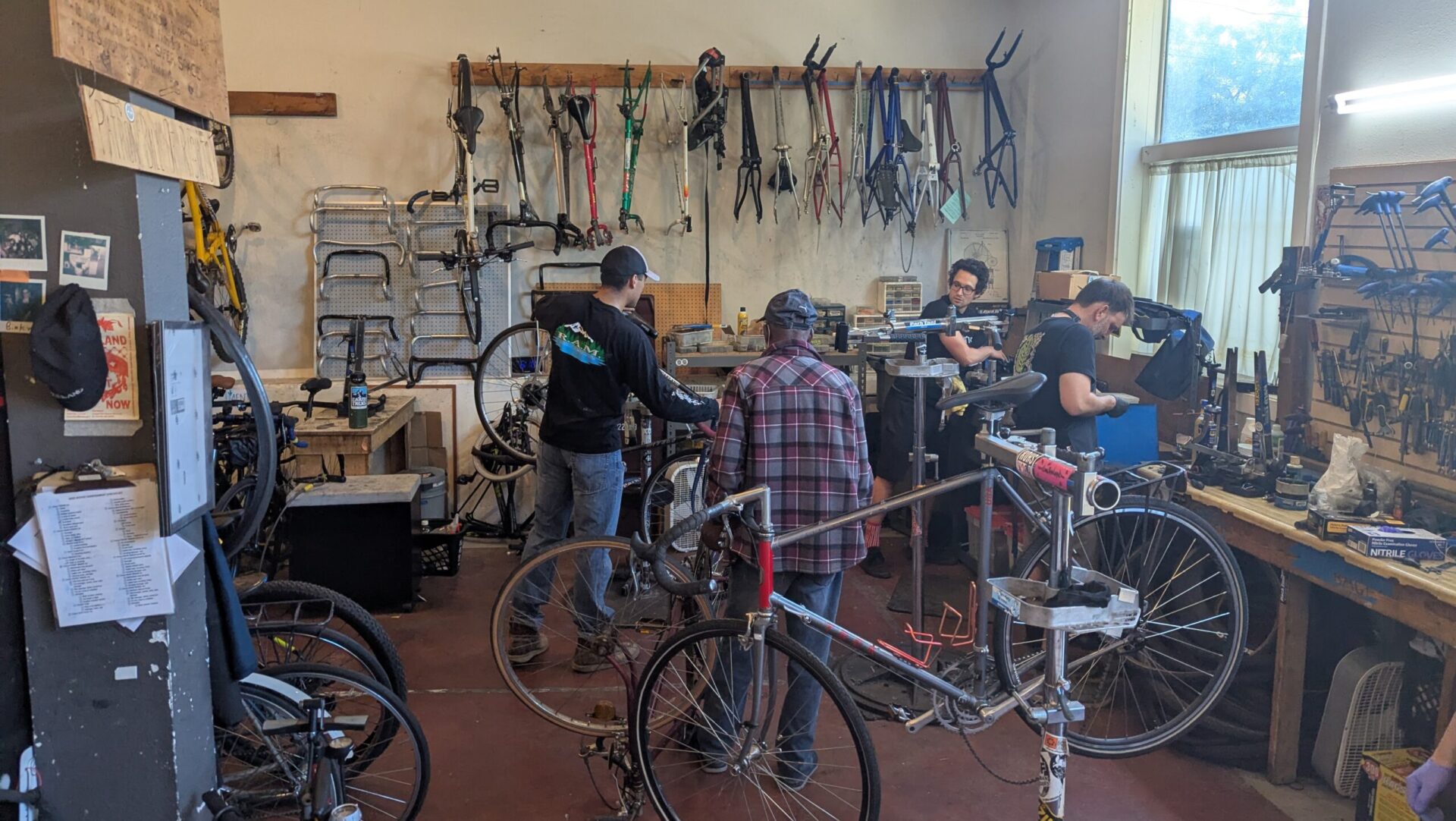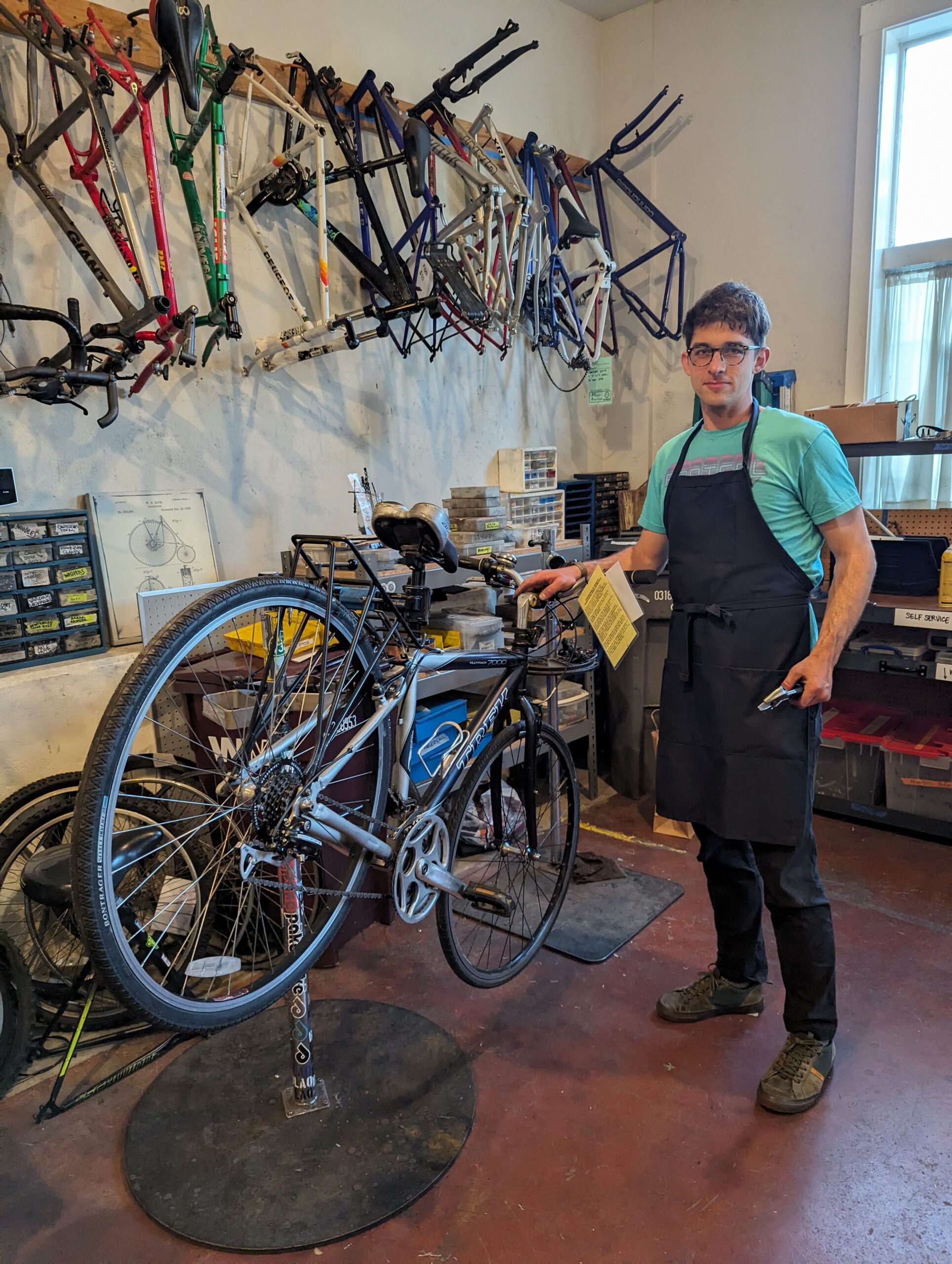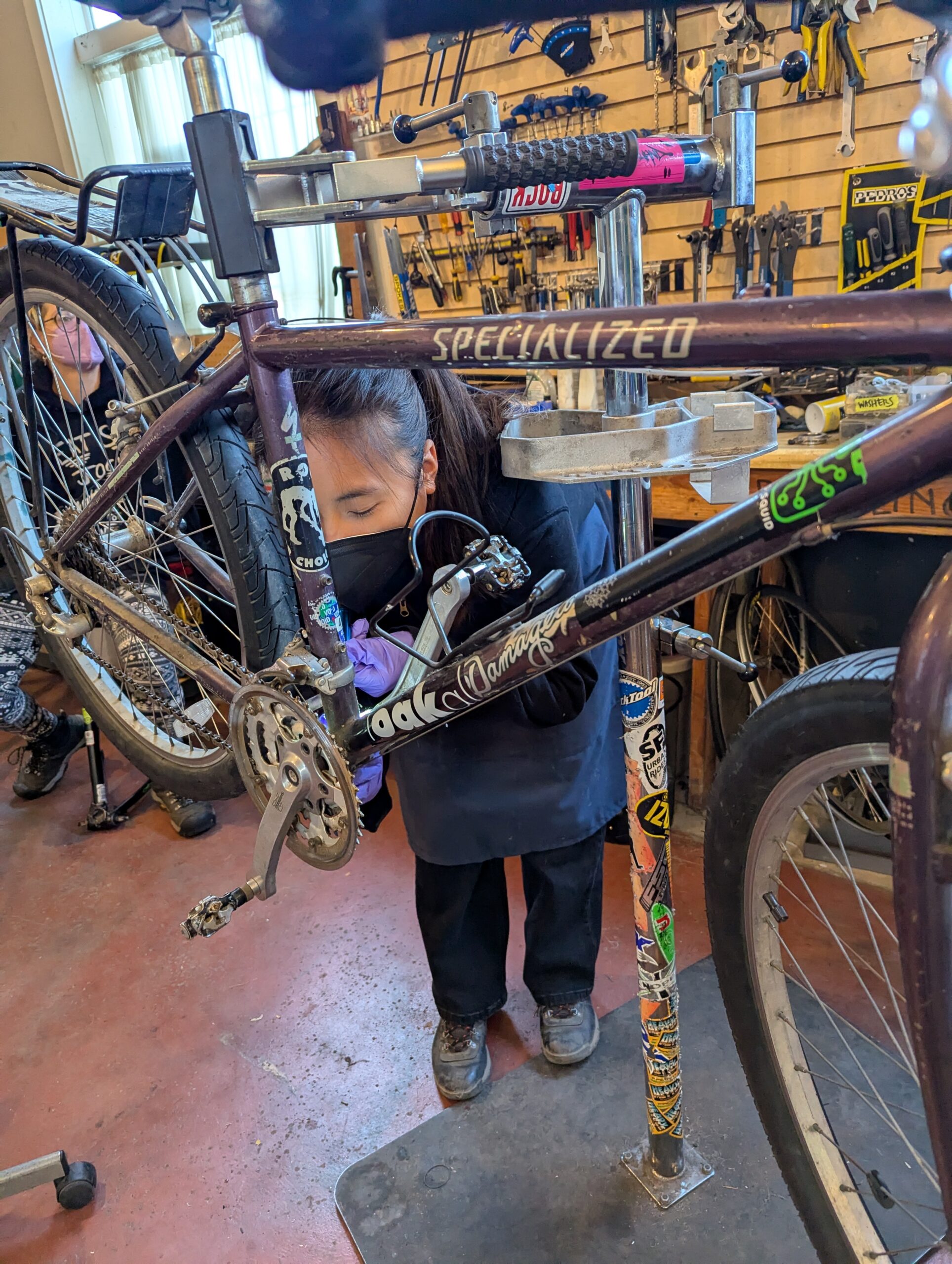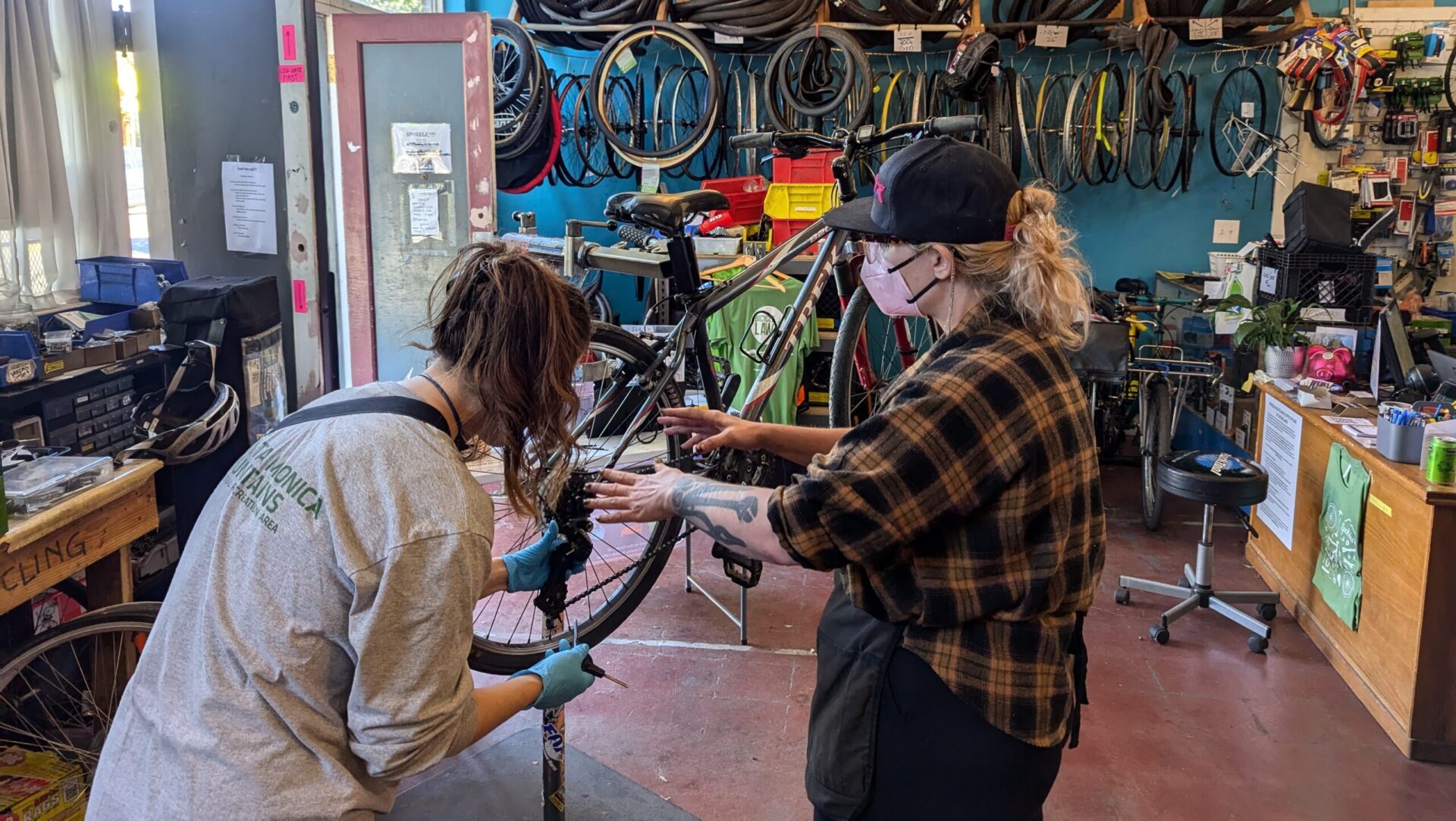August 27, 2025
Situated in the heart of West Oakland, California, Spokeland is no ordinary bike shop—it’s a nonprofit bike collective rooted in accessibility, education, and community care. Founded in 2011, Spokeland works to make bicycling possible for everyone, regardless of income or experience.
Though both Mike Alston, a senior engineer and planner at Kittelson, and Anh Bui, a researcher at the International Council on Clean Transportation, work in transportation at a systems level—planning and designing infrastructure and shaping policy—they see organizations like Spokeland as essential to bridging the gap between planning and practice. While planning, engineering, and policy shape the conditions for biking, community bike shops provide the hands-on support, tools, and education that help people overcome barriers to getting on a bike, especially in neighborhoods where access to affordable transportation is limited.
Mike and Anh have each personally dedicated hundreds of volunteer hours to support Spokeland’s mission of making bicycling knowledge and services accessible to everyone—from the quintessential “bike person” to the first-time bike commuter to the carless household. Here’s why they do it, and how you can get involved.

Many community bike shops advocate for better bicycling infrastructure and help cultivate a broader bicycling culture, especially in neighborhoods that have historically lacked access to bicycling resources and services.
The Many Benefits of Community Bike Shops
Community bike shops (you may also hear of them as bike co-ops or your local “bike kitchen”) fill in service gaps created by traditional bike shops. Whereas dropping off a bike for a tune-up at a bike shop can cost hundreds of dollars, community bike shops offer services like low-cost or free bike repairs, access to tools and workspaces, and refurbished bikes for sale or donation. But the value of community bike shops goes beyond cost savings. At Spokeland, the bicycle owner is the one doing the repairs—they’ll use the tools at the workspace to service or fix their bike themselves under the guidance of staff or volunteer bike mechanics, meaning they are learning valuable skills as they go. Spokeland offers “do it yourself” and “do it together” work stations, and although there is a suggested donation of $10/hour, the organization makes it clear that cost should not prevent someone from accessing the services.
In addition to essential repair services, community bike shops also frequently offer additional educational opportunities for community members, such as workshops, events, and courses that give attendees the confidence and knowledge they need to repair and maintain their two-wheeled vehicles. For example, Spokeland offers the Mechanic Mentor Program, a multiweek class that teaches the fundamentals of bicycle mechanics and repair. By the time participants finish the class, they have learned how to repair every piece of their bike.
Anh says participating in the Mechanic Mentor Program was an empowering experience that boosted her interest and confidence in biking. “Before I took the class, I couldn’t differentiate between different kinds of brakes,” she says. “Now I appreciate bikes more, I’m biking more, and I have knowledge I can share with others.”
Many community bike shops also advocate for better bicycling infrastructure and help cultivate a broader bicycling culture, especially in neighborhoods that have historically lacked access to bicycling resources and services. Staff and volunteers often play a role in shaping city bicycle programs and policies, whether by participating directly in public meetings or by inspiring community interest in getting around by bike.
In short, Spokeland—and other bike shops like it—expand their communities’ relationships to transportation. These organizations contribute to making bicycling:
- more financially accessible through free or low-cost repair services,
- more empowering to communities, as co-ops both teach residents the skills to repair and maintain bikes themselves and advocate for safe and healthy transportation,
- more sustainable, through refurbishing and reselling donated bikes, and
- more inclusive through reducing the barriers to owning and maintaining a bike.
“Nearly every time a new person comes into the shop, they leave saying they’re going to tell everyone they know about it,” says Mike. He’s witnessed Spokeland make a difference in people’s biking lives, and even in their livelihoods. Some shop patrons, inspired to start commuting by bike, get help reviving an old one pulled from the garage. Others are houseless, relying on their bikes and trailers to carry everything they own. One delivery worker discovered their e-bike’s brakes were completely worn; Spokeland’s repairs gave them a safe way to continue earning a living.
Transportation Planner, Bike Champion

To Mike, Spokeland represents the human infrastructure and culture of bicycling, which is an essential part of the transportation planning equation. Mike says he was impacted by reading the book Bicycle/Race, in which author Adonia Lugo describes how building physical bicycling infrastructure makes it possible for more people to bike but doesn’t actually remove most of the barriers to bicycling that people face. The missing piece is culture: how is the community making bicycling practically, financially, and socially accessible for its members that lack resources or don’t see themselves as “people who bike”? Lugo argues that more than funding bike lanes, what’s needed is a culture built and shared by a community: “bike crews at every high school; co-ops at every community center; stipends for the old guys who repaired bikes for kids in their neighborhoods.” This, says Mike, is the critical role that a bike collective can play to make bicycling a reality for more people.
Mike describes how his experiences at Spokeland have impacted how he operates as a consultant, and vice versa. Transportation planning projects rely on the unique ground-level perspectives of community-based organizations (CBOs), as well as the connection to the community a CBO can provide. Yet CBOs typically lack the administrative resources of government agencies and consulting firms.
“In planning projects, we [Kittelson] like to partner with CBOs to get a stronger community connection and a clearer picture of lived experiences,” says Mike. “Through working at Spokeland, it’s become clear to me how important it is to compensate CBOs for their time when we do this, because they often have very limited time and resources.”
Mike stresses that the two halves of this planning coin need each other. Through Kittelson, he’s involved in shaping transportation systems on a large scale. Through Spokeland, he works individually with the people using those systems. “I love working at the big picture,” he says, “and it also makes me so happy to see someone walk into Spokeland saying they don’t know what they’re doing, and roll out with a tuned-up bike they repaired themselves.”
Vehicle Researcher, Community Cyclist
 Before she ever picked up a wrench at Spokeland, Anh was working to make cars less polluting. As a passenger vehicle researcher at the International Council on Clean Transportation, Anh focuses on vehicle emissions regulations, electric vehicle infrastructure, and policy planning. On a neighborhood walk during the COVID-19 pandemic, her curiosity was sparked by a sign in Spokeland’s window. She had been looking for ways to get more involved in her community and began volunteering when Spokeland reopened with limited hours coming out of the pandemic.
Before she ever picked up a wrench at Spokeland, Anh was working to make cars less polluting. As a passenger vehicle researcher at the International Council on Clean Transportation, Anh focuses on vehicle emissions regulations, electric vehicle infrastructure, and policy planning. On a neighborhood walk during the COVID-19 pandemic, her curiosity was sparked by a sign in Spokeland’s window. She had been looking for ways to get more involved in her community and began volunteering when Spokeland reopened with limited hours coming out of the pandemic.
“I’d used a local bike kitchen during college and even volunteered there a few times,” Anh said. “Spokeland felt familiar, and given my career focus of finding cleaner transportation options, I was already wanting to bike more myself.”
Anh says the Mechanic Mentor Program was the inflection point in her enthusiasm for bicycling. The class not only deepened her technical skills but also empowered her to take on more responsibility. She moved from volunteer to guide, which meant she learned to open the shop, run the register, assist patrons with parts, and even help write grants.
Through it all, she has seen firsthand how vital the collective is to the neighborhood. “People come in from places like Concord because we’re open on weekends when other shops aren’t. Some folks can’t afford a big bike shop, but here they can use our tools and get the help they need.”
Now a board member and core volunteer, Anh is committed to making the shop a welcoming space for everyone. “It’s not just about bikes,” she says. “It’s a place people gather, learn, and have fun. It gives both volunteers and shop patrons a sense of belonging.”

Volunteers are the backbone of most bike collectives, which as non-profits tend to rely on donations, grants, and many dedicated volunteers to operate.
Bike Collectives in Your Community
Spokeland is primarily volunteer-run; in fact, volunteers are the backbone of most bike collectives, which as non-profits tend to rely on donations, grants, and many dedicated volunteers to operate.
If you’re interested in supporting the work of one in your community, Mike and Anh advise not to be timid about reaching out. “The demand on both sides outpaces what we can do,” says Mike. “As people visit the shop, they spread the word and more people come through the door. There are also lots of funding sources that exist, but it takes time and effort to prepare the grant applications.” Training volunteers is yet another way to encourage skill-building, and in many community bike shops, volunteers can earn bike parts or shop credit in exchange for their time.
“You don’t have to consider yourself a ‘bike person,’” adds Anh. “Most bike collectives really need administrative volunteers. That could be running a website, helping at events, or even filing taxes. There are so many ways to contribute.”
What if such an organization does not yet exist in your community? They suggest starting small and thinking resourcefully about how you could fill this critical gap. Is there a space that could be used creatively to store bike tools? A small group of committed people who could staff a bike stand a few hours a month? “It’s a service that a lot of people want and need,” Mike says. “Take the smallest starting point.”
If you’d like to learn more about Spokeland, read about their mission, services, and values, sign up for their monthly newsletter, or learn about volunteer and donation opportunities, including their mutual aid fund to support low-income community members who want to get involved but face financial barriers.
